- Home
- Maisey Yates
Carides's Forgotten Wife Page 2
Carides's Forgotten Wife Read online
Page 2
“It’s the only thing,” he said. “That makes sense, doesn’t it?” Because she was his wife. Why couldn’t he remember his wife?
“I had better get the doctor.”
“I’m fine.”
“You don’t remember anything. How can you be fine?”
“I’m not going to die,” he said.
“Ten minutes ago the doctor was in here telling me you might never wake up. So forgive me if I feel a little bit cautious.”
“I’m awake. I can only assume the memories will follow.”
She nodded slowly. “Yes,” she said. “You would think.”
A heavy knock on the door punctuated the silence.
* * *
Rose walked quickly out of her husband’s hospital room, her head spinning.
He didn’t remember anything. Leon didn’t remember anything.
Dr. Castellano stood in the hallway looking at her, his expression grim. “How is he, Mrs. Carides?”
“Ms. Tanner,” she corrected. More out of habit than anything else. “I never took my husband’s name.”
She’d never taken him to her bed—why would she take his last name?
“Ms. Tanner,” he repeated. “Tell me what seems to be going on.”
“He doesn’t remember.” She was starting to shake now, all of the shock, all of the terror catching up with her. “He doesn’t remember me. He doesn’t remember himself.”
“Nothing?”
“Nothing. And I didn’t know… I didn’t know what to tell him. I didn’t know if it was like waking a sleepwalker, or if I should tell him.”
“Well, we will need to tell him who he is. But I’m going to need to consult a specialist. A psychologist. I don’t often deal with cases of amnesia.”
“This is not a soap opera. My husband doesn’t have amnesia.”
“He sustained very serious head trauma. It is not so far-fetched.”
“Yes it is,” she said, feeling desperate. “It is extremely far-fetched.”
“I know you’re worried, but take heart. He is stable. He is awake. Very likely his memories will return. And soon, I would think.”
“Do you have statistical evidence to support that?”
“As I said… I do not often deal in cases of amnesia. Very often a person will lose a portion of their memories following a traumatic head injury. Usually just sections. It’s uncommon to lose everything, but not impossible.”
“He’s lost everything,” she said.
“He’s likely to regain it.”
“These other people. These people who have lost portions of their memory that you’ve treated. How often do they regain them?”
“Sometimes they don’t,” he said, a heavy admission that seemed pulled from him.
“He may never remember,” she said, feeling dazed. Feeling her life, her future, slipping out of her hands. “Anything.”
“I would not focus on that possibility.” Dr. Castellano took a breath. “We will monitor him here for as long as we can. I would imagine that he will do much better recovering at home, monitored by local physicians.”
She nodded. That was one thing she and Leon had in common. His business often kept him abroad, which for her nerves was for the best. But they both loved the Tanner House in Connecticut. It was her favorite thing she had left of her family. The old, almost palatial home, the sprawling green lawns and a private rose garden that her mother had planted in honor of her only child. It was her refuge.
She had always had the feeling it was the same for Leon.
Though they tended to keep to their own wings of the house. At the very least, he never brought women there. He had allowed her to keep it as her own. Had made it a kind of sanctuary for them both.
It was also a condition of their marriage. When her father had hastily commanded the union when his illness took a turn for the worse, the house and his company had been a pivotal point. If—before five years was up—he divorced her, he lost the company and the house. If she left him before the five-year term finished, she lost the house and everything in it that wasn’t her personal possession.
Which meant losing her retreat. And the work she’d been doing archiving the Tanner family history, which stretched all the way back to the Mayflower.
So only everything, really.
And she’d been ready to do it, willing to do it because she had to stop waiting for Leon to decide he wanted to be her husband in every possible way.
Except now here they were.
“Yes,” she said, feeling determined in this at least. “He will want to be moved to Connecticut as quickly as possible.”
“Then as soon as it is safe to move him, we will do so. I imagine he has private physicians that can care for his needs.”
She thought of the doctors and nurses that had cared for her father toward the end of his life. “I have a great many wonderful contacts. I only regret that I have yet more work to give them.”
“Of course. But so long as he is stable we should be able to move him to Connecticut soon.”
She looked back toward the room, her heart pounding. “Okay. We will do that as quickly as possible.”
Going back to Connecticut with Leon was not asking Leon for a divorce. It was not moving toward having separate lives. It was not finally ridding herself of the man who had haunted and obsessed her for most of her life.
But he needed her.
Why does that matter so much?
The image came, as it always did, of herself sitting in the rose garden on the grounds of her family home. She was wearing a frothy, ridiculous gown, tears streaming down her face. Her prom date had stood her up. Probably because going with her in the first place was only a joke.
She looked up, and Leon was there. He was wearing a suit, very likely because he had been planning on going out that night after meeting with her father. She swallowed hard, looking up to his handsome face. Dying a little bit inside when she realized he was witnessing her lowest moment.
“What’s wrong, agape?”
“Nothing. Just… My prom plans didn’t exactly work out.”
He reached down, taking her hand in his, and lifted her off the ground.
She couldn’t remember Leon touching her before. His hand was so warm, his touch so intense it sent a shock of electricity through her.
“If someone has hurt you, give me his name, and I will ensure he is unrecognizable when I’m through with him.”
She shook her head. “No, I don’t need you or my father coming to my defense. I think that would only be worse.”
He curled his fingers around her hand. “Would it?”
Her heart was pounding so hard now she could hardly hear anything over it. “Yes.”
“Then if you will not let me do physical harm to the one who has hurt you, perhaps you will allow me to dance with you.”
She was powerless to do anything but nod. He pulled her against his body, sweeping her into an easy dance step. She had never been very good at it. One of the many things she had never quite mastered. But he didn’t seem to mind. And in his arms she didn’t feel clumsy. In his arms, she felt like she could fly.
“It is not you, Rose.”
“What isn’t?” she asked, her words harsh, strangled.
“It’s this age. It is difficult. But people like you, people who are too soft, too rare for this sort of assimilation required in order to fit in at high school, will go on to excel. You will go much further than they ever will. This is only temporary. You will spend the rest of your life living brighter. Living more beautifully than they could possibly imagine.”
His words had meant so much to her. Words she had held close to her chest. Words she had clung to when she had walked down the aisle toward him, thinking that
perhaps this was what he had meant. That this would be the bright, beautiful living he had promised two years earlier.
Their marriage had been anything but bright. Far from soaring, she’d spent the past two years feeling as though her wings had been clipped. She had a difficult time reconciling the man he’d been then with the man she had married.
Still, that memory was so large, so beautiful in her mind, even with everything that had passed between them since, that she could not deny he deserved her help.
And once he was better, once he was nursed fully back to health, then she would take steps to moving on with her life.
“Just tell me what I need to do,” she said.
CHAPTER TWO
HE STILL COULDN’T remember his name when he was wheeled out of the hospital in a wheelchair and physically moved into a van designed to accommodate his limitations. But he did know that all of this ate at his pride. He did not like to need the assistance of others. He did not like to be at a disadvantage. And yet here he was, completely dependent, his pride in shreds.
Strange how he had no memories and yet he still knew these things. Bone-deep.
He knew his name. He knew his name because it had been spoken around him, over his head, as his wife and various medical professionals made decisions for him. But that was different than knowing his name. Than recognizing it. He was unable to remember who he was, but he wasn’t stupid. Still, that seemed to constitute a compromise that he could not be trusted to make his own decisions.
The drive to the airport was long, and painful, every dip in the road aggravating some injury or another. He was lucky to have less broken than he did. But he was still far too sore to walk on his own. He had a couple of broken ribs, but other than that it was mainly deep contusions. So he had been told. He knew his extensive list of injuries. Had done his very best to memorize them, just so there was something in his brain he knew. Something he knew about himself.
But it was a rather depressing list of facts, he had to admit.
Still, they were the only facts he had.
According to his doctor, there were basics that he would be told. But there were some things that were best allowed to return organically.
He hated that, too. Hated that he wasn’t just dependent on others for physical care. But that he was dependent on them for knowledge.
Every single person in the exam room earlier today knew more about him than he did. His wife knew whole volumes more than he did, undoubtedly.
He looked at her profile, her stoic expression as she looked out the window, watching the scenery go by.
“I know you very well,” he said. He hoped that by saying it it would make it so.
He must. He must know what she looked like beneath her clothes. He had touched her. Kissed her. Countless times, he would imagine. Because they were young—reasonably so—and in love, he presumed.
“I’m not entirely certain of that,” she said.
“Why wouldn’t I?”
She blinked, looking startled. “Of course you do.”
The startled expression, he realized, was her correcting herself. Realizing she had done something wrong.
“Now you are being dishonest with me,” he said.
“I’m not. I’m just doing my best to follow the doctor’s orders. I’m not sure what I’m allowed to say and what I’m not allowed to say.”
“I don’t know that it’s detrimental either way.”
“I don’t want to put memories into your head that aren’t there.”
“Nothing is there at the moment. I’m a blank slate. I imagine I could very easily become victimized by you.”
Color flooded her cheeks. Angry color, he guessed. “I’m not going to do anything to you.” She turned away from him, her gaze fixed out the window again.
“So you say. But I am at your mercy.”
“Oh, and I am so very terrifying.”
“You could be. For all I know, this could be an elaborate ruse. I appear to be a very rich man.”
“How would you know?”
“I had a very nice private room, and an awful lot of attention from doctors.”
“Perhaps it is because you are a special case,” she said, her voice so brittle it reminded him of crystal.
“Oh, I have no doubt of that. There are certain things that I seem to know. That I feel, down deep in my bones. Other things you have told me, such as my name, I simply have to believe. But my importance, the fact that I am a special case, that I know.”
“Amazing,” she said, her tone arch. “Apparently nothing can beat your ego out of you, Leon. That is an amazing feat, I will bow to that.”
“So I am an egotist in addition to being special? I must be very charming to live with.”
She blinked slowly. “You often travel for work. I typically remain in Connecticut. I suppose we find we get on best that way.”
He lifted a shoulder. “Nothing unremarkable about that. I doubt very many people are suited to cohabitation.”
“Another thing you’re very confident about?”
“Yes. I am confident.” He knew that. He felt that. He turned his focus to his wife. “This has been very trying for you,” he said, trying his best to eliminate some of the waxen quality in her face. He did not like seeing her like this. Which was strange, considering he couldn’t remember what she was like on a daily basis. Still, he knew he did not like her being in distress.
“Nobody wants to hear that their husband may never regain his memory.”
“I can imagine. No man wants to hear he may never regain his memory.”
She took a deep breath and let it out slowly. “I’m sorry. This has nothing to do with how difficult it is for me. You’re the one who’s injured.”
“That isn’t true at all. Of course it matters if this is difficult for you. We are one flesh, are we not, agape?” He leaned in slightly, her light floral scent teasing his nose and stimulating…nothing. At least nothing in terms of memory. He was a man, after all, so it did stir something in his gut, low and deep. She was enticing, if not traditionally beautiful. “And if we are one flesh,” he continued, “then what affects me also affects you.”
She shifted, delicate color blooming in her cheeks. “I suppose that is true.”
They were silent the rest of the ride to the airport, silent until he was wheeled onto a plane. A private plane. He had no memory of this, either, so he imagined not remembering her scent wasn’t any more remarkable.
Once they were settled in the opulent surroundings, he leaned back in his chair. “This is mine?”
Rose nodded. “At least I hope so. I would hate to abscond with the wrong private plane.”
“Then we really would make headlines.”
“And of course we don’t want that,” she said, her tone firm.
“Do we not? I would like a Scotch.”
“Certainly not,” she said, frowning. “You’ve had enough pain pills to knock out a large mammal.”
“I am a large mammal. And I am not unconscious.”
“A larger one. Adding alcohol to the mix is a bad idea.” She sat down in the chair across from him. “We do not want it getting out in the press that you are having issues with your memory. I have called a couple of media outlets and let them know you are recovering nicely from what was a traumatic injury. But that you will be back to normal in no time.”
“Efficient of you. Do you work in my company with me?”
She shook her head. “No. But I spent many years helping my father with various details. Particularly after my mother passed away. So I’m well familiar.”
“Am I involved in the same business as your father was?”
Her expression became guarded. “I don’t think we should talk about business. In fact, I know we shou
ldn’t. That is something I discussed with your doctor.”
“How very nice of you to leave me out of it.”
“It’s for your health and well-being,” she said, her words stiff.
“As though I am a child and not a grown man.”
“You may well know less than a child does, Leon.”
“I know a great many things,” he countered. “I do not need to be sheltered.”
“You’re also not in any condition to go to work. Which means you don’t need to be troubled with the details of business.”
“As I said earlier, I am at your mercy.” His head was pounding, and he really could kill someone for a Scotch. He could not be entirely certain, but he felt as though he did not often go this long without having a drink. He found the experience unsettling. Or perhaps, he was simply unsettled because his entire mind was a vacant field, with nothing stretching as far as he could see.
“I don’t intend to let you atrophy on me now, Leon. We have a bit too much of a history for that.” Of course they did. They were married after all. “You should sleep. When you wake up we’ll be in Connecticut. And it’s entirely possible everything will seem a bit clearer.”
* * *
When the town car pulled up to the Tanner house Leon expected…something. A rush of familiarity, a feeling that he might latch on to. Rose had said this place was very important to him. In fact, she had acted as though his being here would be key to his recovery, and he realized as they advanced on the large, palatial home that he had been expecting something of a miracle when it came into view.
There was no such miracle.
It was a beautiful home, comprised of brick, with ivy climbing up the sides, making it appear as though the earth was attempting to reclaim the space for its own. There were no other houses out here. There was nothing but a large building off to the side he assumed was quarters for the staff, or at least had been at one time. Otherwise, there were large sprawling lawns in a vibrant green, backed by thick dark woods that gave the impression this house was in another time and space entirely from the rest of the world.
It was a beautiful home. But none of the magic he had been hoping for was present.

 Last Chance Rebel (Copper Ridge #6)
Last Chance Rebel (Copper Ridge #6) Need Me, Cowboy (Copper Ridge Book 2653)
Need Me, Cowboy (Copper Ridge Book 2653) The Hero of Hope Springs
The Hero of Hope Springs Need Me, Cowboy
Need Me, Cowboy Rancher's Wild Secret & Hold Me, Cowboy (Gold Valley Vineyards Book 1)
Rancher's Wild Secret & Hold Me, Cowboy (Gold Valley Vineyards Book 1) One Night Charmer: Hometown Heartbreaker Bonus (Copper Ridge Novels)
One Night Charmer: Hometown Heartbreaker Bonus (Copper Ridge Novels) Claiming the Rancher's Heir
Claiming the Rancher's Heir Cowboy Christmas Redemption
Cowboy Christmas Redemption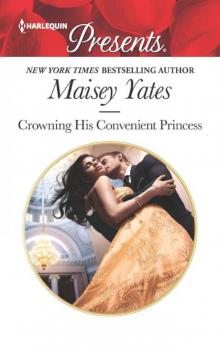 Crowning His Convenient Princess (Once Upon A Seduction... Book 4)
Crowning His Convenient Princess (Once Upon A Seduction... Book 4) His Majesty's Forbidden Temptation (Mills & Boon Modern)
His Majesty's Forbidden Temptation (Mills & Boon Modern) Solid Gold Cowboy
Solid Gold Cowboy His Majesty's Forbidden Temptation
His Majesty's Forbidden Temptation Crowning His Convenient Princess
Crowning His Convenient Princess The Queen's Baby Scandal
The Queen's Baby Scandal Harlequin Desire January 2021--Box Set 1 of 2
Harlequin Desire January 2021--Box Set 1 of 2 Lone Wolf Cowboy
Lone Wolf Cowboy The Bad Boy of Redemption Ranch
The Bad Boy of Redemption Ranch A Good Old-Fashioned Cowboy
A Good Old-Fashioned Cowboy A Bride for the Lost King
A Bride for the Lost King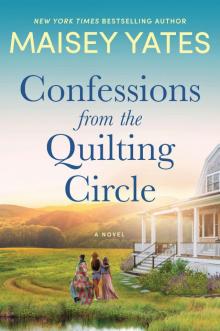 Confessions from the Quilting Circle
Confessions from the Quilting Circle Unbroken Cowboy
Unbroken Cowboy Rancher's Christmas Storm--A Western snowbound romance
Rancher's Christmas Storm--A Western snowbound romance Cowboy to the Core
Cowboy to the Core His Pregnant Princess
His Pregnant Princess Forged in the Desert Heat
Forged in the Desert Heat His Forbidden Pregnant Princess (Mills & Boon Modern) (Conveniently Wed!, Book 21)
His Forbidden Pregnant Princess (Mills & Boon Modern) (Conveniently Wed!, Book 21) Mail Order Cowboy
Mail Order Cowboy Last Chance Rebel
Last Chance Rebel The Rancher's Wager
The Rancher's Wager Secrets from a Happy Marriage
Secrets from a Happy Marriage The Last Christmas Cowboy
The Last Christmas Cowboy Girl on a Diamond Pedestal
Girl on a Diamond Pedestal Her Little White Lie
Her Little White Lie The Couple who Fooled the World
The Couple who Fooled the World Tough Luck Hero
Tough Luck Hero His Forbidden Pregnant Princess
His Forbidden Pregnant Princess TO DEFY A SHEIKH
TO DEFY A SHEIKH Take Me, Cowboy
Take Me, Cowboy The Inherited Bride
The Inherited Bride Marriage Made on Paper
Marriage Made on Paper His Virgin Acquisition
His Virgin Acquisition One Night to Risk It All
One Night to Risk It All Cowboy Christmas Blues
Cowboy Christmas Blues The Billionaire's Intern: Logan Black (Forbidden Book 1)
The Billionaire's Intern: Logan Black (Forbidden Book 1) Strip You Bare
Strip You Bare Untouched
Untouched The Petrov Proposal
The Petrov Proposal Sheikh's Desert Duty
Sheikh's Desert Duty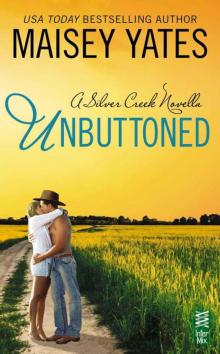 Unbuttoned
Unbuttoned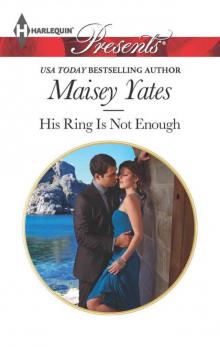 His Ring Is Not Enough
His Ring Is Not Enough Unwrapped
Unwrapped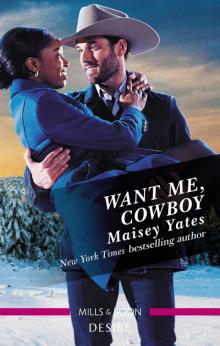 Want Me, Cowboy
Want Me, Cowboy The Italian's Pregnant Prisoner
The Italian's Pregnant Prisoner A Royal World Apart
A Royal World Apart Christmastime Cowboy
Christmastime Cowboy Pretender to the Throne
Pretender to the Throne Rekindled
Rekindled The Queen's New Year Secret
The Queen's New Year Secret Down Home Cowboy
Down Home Cowboy Finally His Bride (Montana Born Brides Series Book 4)
Finally His Bride (Montana Born Brides Series Book 4) Avenge Me
Avenge Me Crazy, Stupid Sex
Crazy, Stupid Sex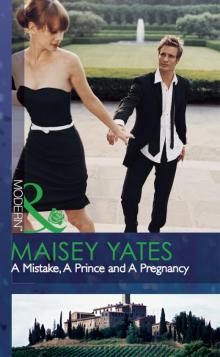 A Mistake, A Prince and A Pregnancy
A Mistake, A Prince and A Pregnancy Hometown Heartbreaker
Hometown Heartbreaker A Hunger for the Forbidden
A Hunger for the Forbidden Brokedown Cowboy
Brokedown Cowboy Princess from the Shadows Maisey Yates
Princess from the Shadows Maisey Yates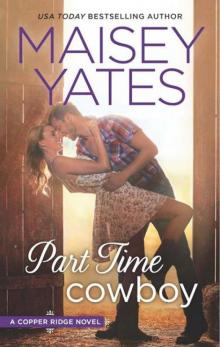 Part Time Cowboy (Copper Ridge Book 1)
Part Time Cowboy (Copper Ridge Book 1) Claim Me, Cowboy
Claim Me, Cowboy Wild Ride Cowboy
Wild Ride Cowboy The Rancher's Baby
The Rancher's Baby The Prince's Captive Virgin
The Prince's Captive Virgin Seduce Me, Cowboy (Mills & Boon Desire) (Copper Ridge)
Seduce Me, Cowboy (Mills & Boon Desire) (Copper Ridge) Untamed Cowboy
Untamed Cowboy Smooth-Talking Cowboy
Smooth-Talking Cowboy The Billionaire's Marriage Deal
The Billionaire's Marriage Deal The Life She Left Behind
The Life She Left Behind The Greek's Nine-Month Redemption
The Greek's Nine-Month Redemption Carides's Forgotten Wife
Carides's Forgotten Wife Hold Me, Cowboy
Hold Me, Cowboy The Spaniard's Pregnant Bride
The Spaniard's Pregnant Bride Unexpected (A Silver Creek Romance)
Unexpected (A Silver Creek Romance) The Prince and the PA
The Prince and the PA A Christmas Vow of Seduction
A Christmas Vow of Seduction The Last Di Sione Claims His Prize
The Last Di Sione Claims His Prize Snowed in with the Cowboy
Snowed in with the Cowboy Fifth Avenue Box Set: Take MeAvenge MeScandalize MeExpose Me
Fifth Avenue Box Set: Take MeAvenge MeScandalize MeExpose Me Hard Riding Cowboy
Hard Riding Cowboy Bound to the Warrior King
Bound to the Warrior King Heir to a Dark Inheritance
Heir to a Dark Inheritance Bound to Me
Bound to Me At His Majesty's Request
At His Majesty's Request The Italian's Pregnant Virgin
The Italian's Pregnant Virgin Slow Burn Cowboy
Slow Burn Cowboy A Game of Vows
A Game of Vows Married for Amari's Heir
Married for Amari's Heir The Argentine's Price
The Argentine's Price Bad News Cowboy
Bad News Cowboy Breaking All Her Rules
Breaking All Her Rules A Copper Ridge Christmas
A Copper Ridge Christmas Hajar's Hidden Legacy
Hajar's Hidden Legacy One Night Charmer
One Night Charmer One Night in Paradise
One Night in Paradise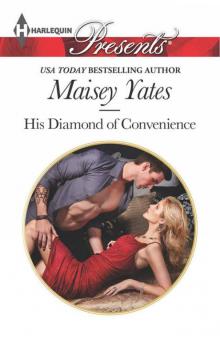 His Diamond of Convenience
His Diamond of Convenience